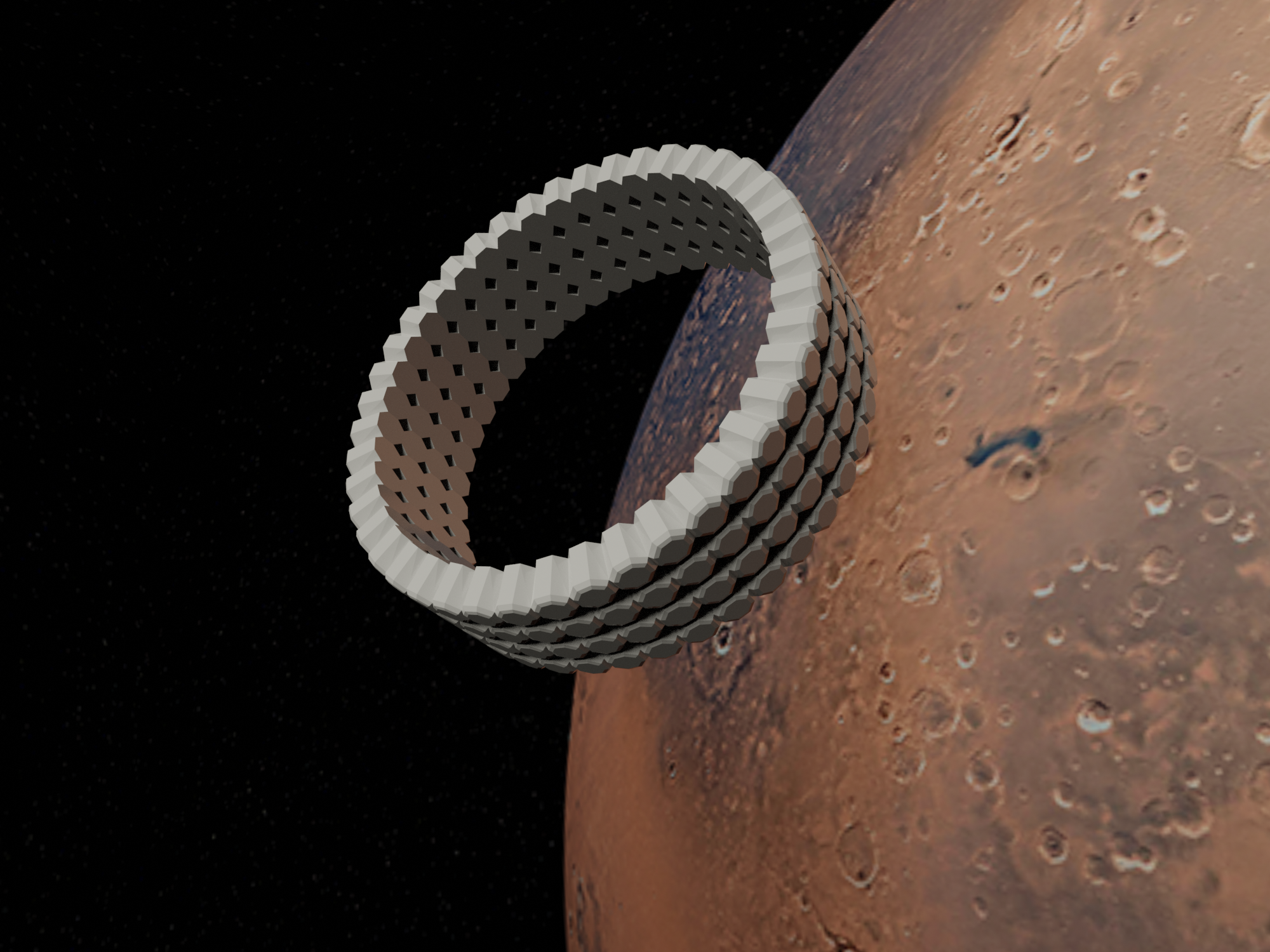Chapter 2: First Footsteps
I cycle the small airlock and watch the indicator turn green. With a soft hiss, the outer hatch unseals. A pale orange light filters in around its edges. My suit’s HUD scrolls environmental data: Pressure 1.45 atm, Temp -179°C, Composition N₂ 96%, CH₄ 3%… All expected, yet reading it while standing on Titan feels unreal.
I turn the handle and push the hatch open. Titan’s sky greets me—an endless orange gloom. My helmet lights flick on automatically, cutting through the perpetual dusk. I step out slowly and descend the ladder attached to the lander’s side. Lower gravity means I practically bounce from rung to rung. The last one is just a meter above ground. I pause, one boot hovering. My mouth is dry.
A voice crackles in my ear—Commander Patel from inside, his tone half teasing, half solemn: “Go ahead, Mira. You’re up. One small step…”
I chuckle, rolling my eyes inside the helmet. “No pressure, huh?” Everyone’s expecting something profound. But all I manage is an excited laugh as I finally plant my boot onto Titan’s soil. The first human footprint on Titan.
The ground gives slightly under my weight, like stepping onto packed snow that has a thin crust. I press down and take a step forward, holding onto the ladder for balance. My foot sinks perhaps an inch into a grainy surface. For a split second I panic, thinking I’ll plunge into quicksand, but it holds. The texture is oddly familiar—wet sand mixed with icy grit. A dark brown sludge oozes around the sole of my boot. It’s not water (water is rock-hard ice here) but methane-rich mud. I’m glad for the suit’s waterproofing.
“I’m on the surface,” I say breathlessly. “It’s… kind of squishy.” Not quite as iconic as Armstrong, but it draws a laugh from the team.
I steady myself and let go of the ladder. Titan’s gravity makes me feel light as a feather in this heavy suit. I take a few bouncing steps away from the lander and turn to look around. The landscape unfolds under my helmet lights and the faint amber daylight. It’s otherworldly: a gently rolling plain strewn with rounded ice pebbles the size of my fist. In the distance, maybe a hundred meters out, stands a low ridge of dunes, dark and linear, stretching across the horizon. And beyond that, a hint of reflective glimmer—a lake under the haze, likely liquid methane or ethane. I can’t see it clearly through the mist, but knowing it’s there sends a thrill through me.
The air itself has a tangible presence—thick and hazy. My suit’s external mic picks up a soft whistle of wind. Titan’s breeze, smelling (according to my instruments) of hydrocarbons and nitriles, brushes past me at a leisurely pace. It feels strangely intimate, as if the moon is greeting me with a cautious breath.
One by one, my crewmates emerge. Jack comes next, agile in the low gravity. He hops off the last rung and lands beside me with a grin visible through his visor. “And here I thought Mars was cool. Titan, you just upped the game,” he says. He takes a playful half-jump, testing the gravity, and rises a solid meter before drifting back down. “Ha! Low-G trampoline, guys!”
“Careful, Flyboy,” I laugh. “You don’t want to fall and crack your helmet on day one.”
He puts a hand over his heart in mock solemnity. “Don’t worry, Mom, I’ll be good.”
Valentina joins us, stepping a bit too hard—her boot crunches through the thin crust on the ground and sinks to mid-calf in muck. “Whoa!” She struggles for a second, then pulls free with a slurp. A chuckle buzzes in my ear as Aegis transmits, “Watch your step. The surface composition appears to include a fragile icy crust over a softer substrate—likely a mix of hydrocarbons and water ice slush.”
“I noticed,” Valentina replies dryly, shaking off brownish goo from her boot. “Gracias for the heads-up, Aegis.”
Finally Commander Patel descends, carrying the small flag of our mission. We’re an international crew, but the flag is the pale blue circle of Earth—symbolizing all humanity. He plants it into the ground near the lander’s footpad. The damp sand yields easily. “May this mark the beginning of a new era of exploration,” he intones ceremoniously. Then, lighter, “And let’s hope it doesn’t sink into the mud.”
We gather for a moment around the flag, four figures in blue suits under an alien sky. I find myself grinning uncontrollably. Despite the biting cold and dim light, Titan feels oddly welcoming. Perhaps it’s the thick atmosphere wrapping around us, or the gentle winds. It’s hostile, yes—lethal cold, no oxygen, toxic smog—but it’s also surprisingly Earth-like in some ways. The ground underfoot, the breeze, the pressure against my suit… It feels solid and tangible, not the void of space or the airless dust of the Moon.
“Alright, science lead,” Patel turns to me. “Where do we start?”
Right. We have a checklist for the first EVA: gather initial soil and atmospheric samples, check the lander’s exterior, deploy a seismometer, among others. But for a second I just want to savor this moment. I’m standing on Titan, the dream of my life. Over the radio link’s background, I hear my own excited breathing. Focus, Mira.
“Let’s get a soil sample from right here next to the lander,” I say. “Then one near that dune crest over there,”—I point toward the ridge—“to compare composition. Jack, you set up the weather station?”
“Aye aye,” Jack responds, already trudging back to the cargo bay on the lander’s side to retrieve gear. His movements are comically slow-motion, as each step propels him higher than expected. It’s like watching an astronaut wading through a bouncy castle.
Valentina and I kneel down where I made my first footprint. The suit joints are a bit stiff in the extreme cold, but flexible enough. I scoop a small sample of the brownish surface material into a vacuum-sealed canister. It resists slightly, with chunks breaking like soggy cookie crust. A dark, tarry smell wafts up even through my suit’s external sensors—rich in organics. Titan’s trademark aroma, I think with a smile: methane, ethane, maybe a hint of benzene and who knows what else. Eau de Titan.
As I seal the container, a fine mist condenses on it and immediately forms ice crystals. The moisture from my own breath on the tools? Or perhaps trace methane humidity freezing out. Everything here is so cold that even touching the ground with our tools creates a rime of frost.
While Valentina labels the sample, I look up at the sky. The Sun is just a small smudge of light, barely visible through orange clouds. Daytime, yet almost as dark as Earth’s dusk. “Aegis, what’s the solar elevation?” I ask.
The AI responds promptly, “The Sun is approximately 30 degrees above the horizon, but current visible light at surface is 0.1% of Earth’s. Essentially perpetual orange twilight.”
“Beautiful, though,” I murmur. The scattering of light by the haze paints the entire sky apricot. I imagine high above us the thick clouds and, beyond, Saturn with its rings. Too bad the haze hides the view; I’d love to see Saturn looming up there. Maybe on a clearer day or with infrared cams.
Jack’s voice breaks in: “Weather station up and running. Wind is a balmy 5 klicks per hour from the east, temperature… a toasty minus 179 Celsius. Barometer holding steady.”
“Any chance of rain?” Valentina jokes. “Methane showers?”
“Hmm, Aegis, probability of precipitation today?” I query in the same jesting tone.
The AI plays along. “Precipitation unlikely. Skies: overcast with a 20% chance of hydrocarbon drizzle. Don’t forget your umbrellas, crew.”
I chuckle. It’s easy to joke now that we’re safely down. The terror of entry and descent is fading into memory, replaced by scientific giddiness.
Commander Patel calls us to focus. “Mira, Valentina, head toward that dune ridge but don’t go too far. Keep within 50 meters of the lander. We stick together on EVA-1.” He turns to Jack, “Nguyen, you’re on tether—monitor suit telemetry and be ready to assist if anyone gets stuck in a sinkhole or something.”
“Aye, Commander.” Jack grabs a long safety tether reel from the lander, clipping it to his suit and then attaching it to mine and Valentina’s belts. Sensible precaution, though moving tied together in low gravity will be… interesting.
Like three mountain climbers on a rope, we carefully trek the short distance to the nearest dune. Each footstep makes a faint crunch-squish. The ground here starts to slope up and is drier; dark grains of what is likely solid tholin (organic particles) slide under my boots like sand. I shuffle more than step to avoid bouncing off the ground. It’s surprisingly effortless to walk in this gravity—an almost joyful sensation, if not for the cumbersome suit.
We reach the crest of the dune—a modest hill about 3 meters high. From here, the view is even more breathtaking. On the far side, I see the shoreline of the methane lake glinting about half a kilometer away. Its surface is inky and mirror-smooth, reflecting the dim light. Could anything be living in that alien sea? The thought sends a thrill through me. Titan’s lakes are one of the prime targets for our mission; if life exists in liquid methane, that’s where we might find it.
“Alright, getting second soil sample,” I announce, kneeling again. The dune’s material is drier, fine-grained and dark—likely photochemical aerosol residue that has settled out of the sky over millennia. Titan’s version of sand. It pours into my sample container easily, like black talcum powder. No obvious signs of biology yet, but who knows what analysis will find.
Valentina plants a small seismometer spike into the ground nearby. It will listen for Titan-quakes or the rumble of distant cryovolcanoes. As she fiddles with it, I take a moment to simply exist here. The silence is profound, broken only by the soft flapping of our tether line and the faint hum of our suit fans. My gaze drifts across the plain. In the haze, the lander is a comforting silhouette with its beacon light blinking. Beyond it, endless dunes and plains fade into orange gloom. We are far, far from home.
Jack’s voice is quiet when he speaks, as if reading my thoughts. “Kinda hits you now, doesn’t it? Just how alone we are.”
I look over; through his visor I see his usual jovial expression has softened. I nod. “A billion kilometers from Earth… no rescue if something goes wrong,” I reply softly. “It’s…heavy.” For a moment, the weight of that reality presses on me. This isn’t like a jaunt to the Moon or even Mars. We can’t just radio Houston for immediate help. We’re pioneers on an alien world, utterly self-reliant.
Valentina finishes with the seismometer and gives a thumbs-up. “Device is live. And hey, we’re not completely alone. We have our lovely assistant.” She pats the side of her helmet. “Aegis, darling, how’re things back at base?”
“All systems nominal, Valentina,” Aegis replies with what almost sounds like fondness. “I’m keeping the hab warm for your return. Current interior temperature is a cozy 20 degrees Celsius. Might I suggest hot cocoa when you’re back?”
I grin at the thought. “Now that’s an AI that understands morale.”
“Just doing my job,” Aegis quips.
We wrap up our EVA a short while later. Titan has given us a gentle welcome today—no sudden storms or surprises, just steady cold and twilight calm. As we hop back toward the lander, I carry the precious first samples. I can’t wait to get them under a microscope in the lab. Something in my gut tells me Titan has secrets just waiting for us to unravel.
At the ladder, Commander Patel insists on doing a final visual check of the lander’s exterior before we all go in. While he does that, I find myself gazing out toward the lake one last time. The urge to walk right to its edge tugs at me, but that’s for another day. Still… I imagine kneeling by that liquid methane shore, sample kit in hand. Will we scoop up alien microbes? Exotic chemicals that hint at life? Patience. This is only day one.
Jack taps my shoulder gently. “Head in the clouds already, Professor?” he teases (an old nickname from training—though I’m not a professor, just a mission specialist with a PhD).
“More like head in the haze,” I reply. “I was just thinking about what might be in that lake.”
He follows my gaze. “Kraken Mare junior over there?”
I smile; we’ve dubbed this small lake “Little Kraken” since it’s near the massive Kraken Mare region. “Yeah. Everything we’ve dreamed about—methane-based life, weird chemistry—it could be right there.”
Jack’s eyes crinkle with excitement. “We’ll check it out soon. And if anything’s swimming in there, we’ll be the first to know.”
For a moment, we stand together, two tiny blue figures on the edge of an alien dune, staring into the unknown. In the orange half-light, I notice how his face, lit by the helmet display, shows pure exhilaration. It’s the same expression I probably have. I feel a warm camaraderie—and something a bit more personal—spark between us. But before either of us speaks, Commander Patel’s voice rings out: “Alright team, let’s wrap it up. Everyone inside. We have plenty of time for sightseeing later.”
With one last look at Titan’s mysterious horizon, I climb the ladder and re-enter the airlock, eager to see what discoveries the next hours will bring.
End of Chapter 2


